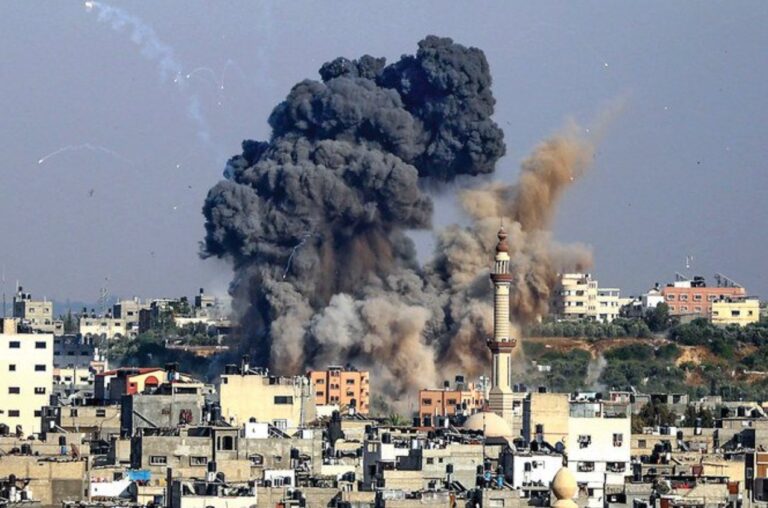Israel is declaring a state of war and preparing for a long-lasting conflict, including the likely ground operation in Gaza, at whose border the tank deployment is swelling.
These are the “significant military actions” voted on by the Netanyahu government’s Security Council that the premier heralded within hours of the enemy attack, evoking “a campaign of a vehemence and magnitude never seen before.”
Table of Contents
Heavy blood toll in both Israel and Palestine
Testifying to the strength of the ongoing confrontation are the figures. In Israel, casualties from Hamas raids, including those from the horrific Israeli rave party massacre at the border, have reached more than 700. Of the approximately 2,500 wounded, many are serious.
And many are still missing from the roll call. More than 100 people taken hostage and brought to Gaza by Hamas militiamen. Tel Aviv and Jerusalem appear ghost towns, with people barricaded in their homes after Saturday’s rain of rockets.
The country is shutting down. Airlines one after another are canceling flights to and from Ben Gurion Airport. Many tourists have been stranded. On the other side, Gaza, the dead under furious attacks by the Israeli air force have reached over 400 civilians and militiamen, with 2,300 wounded.
Retaliation on Gaza
To the thousands of rockets and missiles fired by Hamas on Israel, Tel Aviv responded with massive airstrikes on the Gaza Strip, including drones and artillery strikes. An Israeli strike destroyed a skyscraper in central Gaza City. The 14-story Palestine Tower was home to offices linked to Hamas and Islamic Jihad.
But it also housed dozens of families who were given ten minutes’ notice to evacuate. The destruction caused no casualties.
Throughout the day Saturday, the violence extended, although to a much lesser extent, to the West Bank, where there were clashes between Palestinian residents and Israeli settlers. Israeli forces killed six Palestinian youths, including a 13-year-old teenager.
The Palestinian Authority said Israeli settlers allegedly attacked several Palestinian settlements, possibly in retaliation for Hamas attacks. Six Palestinians were killed, including a child, according to the Palestinian Health Ministry.
On Saturday evening, rockets also continued to fire from Gaza aimed at Israeli cities. Tel Aviv was hit by more than 150 rockets, which caused extensive damage.
Israel declares the state of war
Prime Minister Benjamin Netanyahu declared that the country is “at war” and mobilized thousands of reservists. From the opposition benches, Yair Lapid said he was prepared to create a national unity government to deal with the emergency.
In an address to the nation Netanyahu vowed to use “all the power” of the IDF to destroy Hamas capabilities. Calling today’s events “something never before seen in Israel,” he vowed to ensure that “it will never happen again.” “We will win, but the price will be heavy,” he added.
“It will be a long and difficult war,” Netanyahu said, because the ultimate goal now is to destroy “the military and governmental capabilities” of Hamas and its ally, Islamic Jihad, and to “take away their ability and desire to threaten and harm the citizens of Israel for many years to come.”
“We will reduce to rubble the places where Hamas hides and operates from,” he said, enjoining Palestinian civilians to “leave immediately.” One of the most likely and widespread assumptions among analysts, but still unconfirmed, is that Israel is preparing to invade the Gaza Strip by land.
Indeed, some media outlets have noted how large numbers of Israeli soldiers are assembling along the border barrier. Photos and videos of columns of trucks transporting military vehicles from central areas of Israel to the borders with Gaza are circulating on social media.
It is unclear whether this large increase in forces was simply decided in response to Saturday’s attack. Or whether it is actually in preparation for a ground invasion.
Read also: Why is there conflict in the Gaza Strip? The history and reasons for the war
The international reactions
Palestinian President Mahmoud Abbas told U.S. Secretary of State Antony Blinken that “injustice” to the Palestinians is exploding the conflict with Israel, according to Palestinian news agency Wafa.
In a phone call, Abbas also said the ongoing escalation is due to the “practices of the Israeli colonialists and occupation forces, and the aggression against the holy sites of Islam and Christianity.”
U.S. President Joe Biden condemned the Hamas attacks and reiterated his country’s closeness to Israel: “In this moment of tragedy, I want to say to [Hamas], to the world and to terrorists around the world: the United States stands with Israel. Israel has the right to defend itself and its people, period. There is never a justification for terrorist attacks, and my administration’s support for Israel’s security is solid and unwavering.”
Quite different is the reaction from the Middle East. In several countries thousands took to the streets to demonstrate in support of Hamas. The region, openly or indirectly, has supported and encouraged the actions of the Islamist movement and holds Israel responsible for the escalation.
In Lebanon, Hezbollah demonstrations have gathered hundreds and thousands of participants across the country. Neighboring Syria openly praised Hamas.
Saudi Arabia made a relatively discreet statement, calling for a halt to the violence. But said Hamas’ actions are “the result of the continued occupation and deprivation of the Palestinian people of their legitimate rights.” Similar statements were made by Kuwait, Iraq, Qatar and Oman.
Iran openly and directly praised Hamas. Iranian parliamentarians chanted “Death to Israel” during the evening sassion. While the advisor to Iran’s supreme leader, General Rahim Safavi, declared, “We will stand with the Palestinian fighters until Palestine and Jerusalem are liberated.”
Read also: Israel studies and recruits artificial intelligence for warfare operation












